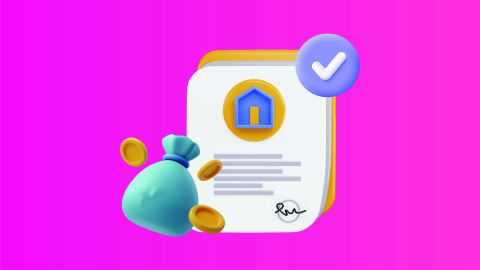A loan against property (LAP) is a convenient way to access large funds by pledging your property as security. It offers lower loan against property interest rates compared to unsecured loans, along with flexible repayment tenures and quick approval. Whether you need money for business growth, education, medical needs, or personal goals, a LAP provides a cost-effective solution without losing ownership of your property. Before applying, it is important to understand the applicable interest rates, fees, and charges to manage your repayments effectively.
Loan against property interest rate and fees
When applying for a loan against property, assessing the interest rate is crucial. A competitive interest rate can significantly reduce your repayment burden, while a higher rate might strain your finances. To manage costs effectively, choose a lender offering attractive rates.
Typically, a loan against property has lower interest rates compared to unsecured loans. These rates vary based on several factors, with employment type being a key determinant. Bajaj Finance offers tailored interest rates for salaried and self-employed individuals, ensuring flexibility and affordability. Get loan of up to Rs. 10.50 crore against your property within 72 hours* of the approval.
Loan Against Property Interest Rates (Floating)
Employment Type |
Effective ROI (p.a.) |
Salaried |
8% to 18% per annum (fixed or floating rate of Interest) |
Self-employed |
8% to 18% (fixed or floating rate of interest) |
Floating loan against property interest rates vary for salaried and self-employed professionals, offering flexibility with market-linked changes, making them suitable for long-term financing with potential savings.
Current Loan Against Property Interest Rates
| Type of fee |
Applicable charges |
| Rate of interest (fixed or floating rate of interest) | 8% to 18% per annum |
| Processing fee | Up to 3.54% of the loan amount (inclusive of applicable taxes) |
| Documentation charges | Up to Rs. 2,360/- (inclusive of applicable taxes) |
| Flexi facility charge | Term Loan – Not applicable |
| Prepayment charges | Full Pre-Payment |
| Annual maintenance charges | Term Loan: Not applicable Flexi Term Loan (Flexi Dropline): Not applicable Flexi Hybrid Term Loan: Up to 0.295% (inclusive of applicable taxes) of the total withdrawable amount during Initial loan tenure. Not applicable for subsequent loan tenure. |
| Bounce charges | Rs. 1,500 per bounce. |
| Penal Charge | Penal charge is applicable in the following scenarios: Delay in payment of instalment(s) shall attract Penal Charge at the rate of 36% per annum per instalment from the respective due date until the date of receipt of the full instalment(s) amount. |
| Stamp duty (as per respective state) | Payable as per state laws |
Mortgage origination fees |
Up to Rs. 6,000/- per property (Inclusive of applicable taxes). |
| Repossession charges | Recovery of charges |
**The option of switching from floating to fixed rate of interest and vice versa would be applicable only to Borrowers whose loan qualify as personal loan as per RBI circular on Reset of Floating Interest Rate on Equated Monthly Instalments (EMI) based Personal Loans- RBI/2023-24/55-DOR.MCS.REC.32/01.01.003/2023-24.
Personal loans refers to loans given to individuals and consist of (a) consumer credit, (b) education loan, (c) loans given for creation/ enhancement of immovable assets (e.g., housing, etc.), and (d) loans given for investment in financial assets (shares, debentures, etc.).
Further, Consumer credit refers to the loans given to individuals, which consists of (a) loans for consumer durables, (b) credit card receivables, (c) auto loans (other than loans for commercial use), (d) personal loans secured by gold, gold jewellery, immovable property, fixed deposits (including FCNR(B)), shares and bonds, etc., (other than for business / commercial purposes), (e) personal loans to professionals (excluding loans for business purposes), and (f) loans given for other consumptions purposes (e.g., social ceremonies, etc.). However, it excludes (a) education loans, (b) loans given for creation/ enhancement of immovable assets (e.g., housing, etc.), (c) loans given for investment in financial assets (shares, debentures, etc.), and (d) consumption loans given to farmers under KCC. For risk weighting purposes under the Capital Adequacy Framework, the extant regulatory guidelines will be applicable. (as defined in XBRL Returns – Harmonization of Banking Statistics-RBI/2017-18/117-DBR.No.BP.BC.99/08.13.100/2017-18)
Factors Affecting Loan Against Property Interest Rates
Since a mortgage loan is secured by a high-value asset, that is, a residential or commercial property, loans against property interest rates are usually economical. However, lenders do not offer the same property loan interest rates to all borrowers uniformly.A loan against property lowest interest rate depends on several key factors.
Credit score
One of the important factors that affect the loan against property interest rate is your CIBIL score. Though it is a secured loan with affordable rates of interest. The minimum CIBIL score required for a loan against property (LAP) can vary depending on the lender and other details about the loan.
Applicant’s profile
When deciding property loan interest rates, lenders consider your total financial profile. Salaried individuals may secure better loan against property interest rates than self-employed individuals as they enjoy a fixed income. However, self-employed professionals like doctors and CAs can get low interest rates. If salaried, your lender will prefer you have a reputed employer, whose ability to pay salaries is unquestionable.
Likewise, your income and debt-to-income ratio will be evaluated. A high income and low debt-to-income ratio can translate to an affordable interest rate. Your age, and the number of working years left, also impacts the loan against property interest rates you get.
Loan duration
Opting for a short tenure can help you secure a low interest rate as lenders can better estimate variations in your credit profile and their own loan against property interest rate over the short term. When the repayment window is long, they may have to budget for some change. However, you must bear in mind the impact of your EMI on your financial profile, and in particular, your debt-to-income ratio. If lenders perceive that a short tenure increases the risk of default, they may charge a high interest rate or ask you to opt for a long tenure.
Property to be mortgaged
The type of property you provide as the mortgage such as its location, condition, and age affect the loan interest rate. Residential properties are deemed to be more valuable and can fetch lower loan against property interest rates than commercial properties. Similarly, a property in a prime location, with ample civic amenities, and in pristine condition will have a higher resale value than a property in a rundown condition, located in a less desired locality. Better properties attract better loan against property interest rates.
Why choose a loan against property?
A loan against property is not just a financial product—it’s a powerful tool to unlock the potential of your property without losing ownership. Whether you need funds for business expansion, education, medical emergencies, or other significant financial goals, an loan against property provides a versatile solution. By leveraging your property, you gain access to substantial funds at competitive interest rates. With flexible repayment options and longer tenures, loan ensure minimal strain on your monthly finances while helping you achieve your goals. Enjoy lower EMIs starting from Rs. 750/lakh* and longer repayment tenures. Take the first step toward realizing your financial aspirations today.
Tips to avail mortgage loan at low interest rates
Securing a mortgage loan at a low interest rate is a strategic process that requires careful planning. Firstly, maintain a high credit score by ensuring timely repayment of bills and loans. This demonstrates to lenders that you're a trustworthy borrower. As a consistent income source indicates financial stability, strive to maintain steady employment. The property offered as collateral is also considered; high-value properties in prime locations may fetch better rates. Don't shy away from negotiating with your lender, especially if you share a good banking history with them. Finally, remember to compare loan offers from different lenders. With a thorough comparison, you can select the most beneficial mortgage loan at a low-interest rate.
How to reduce LAP interest rate burden?
Reducing the burden of Loan Against Property (LAP) interest rates involves a combination of strategic financial management and proactive steps. Here's how you can work towards lightening the interest rate burden:
- Prepayment: Whenever you have surplus funds, consider making partial prepayments towards your LAP. This reduces the principal amount, resulting in lower interest payments over time.
- Loan Tenure Reduction: If your financial situation allows, opt for a shorter loan tenure. While this increases your monthly payments, it significantly reduces the overall interest payout.
- Regular Repayment: Ensure that you make your LAP payments on time. Late payments can attract penalties, increasing the interest burden. Automate payments to avoid missing deadlines.
- Interest Calculation: Some lenders offer the option of calculating interest on a reducing balance basis rather than a flat rate. Opt for this if available, as it can save you money.
- Negotiation with Lender: Contact your lender to negotiate better terms, including a reduction in the interest rate. Highlight your good payment history and inquire about any ongoing promotions.
- Savings and Investments: Use interest-bearing savings accounts or investments to set aside funds for LAP repayments. This can help you offset the interest burden over time.
- Budgeting and Cutting Expenses: Create a realistic budget to identify areas where you can cut unnecessary expenses. Allocate the savings towards LAP repayments.
- Financial Planning: Consult a financial advisor to create a comprehensive financial plan. They can provide insights into managing your LAP and other financial goals effectively.
- Leverage Windfalls: If you receive unexpected windfalls like bonuses, tax refunds, or inheritance, consider using a portion of these funds to make lump-sum payments towards your LAP.
Remember that while these strategies can help reduce the LAP interest burden, they should be aligned with your financial capabilities and long-term goals. It's advisable to consult with financial professionals before making significant financial decisions.
How to apply for Loan Against Property?
As a loan against property is a secured loan of a sizable amount, the best approach is to ensure that you follow every step correctly to avail of funds and enjoy the lowest loan against property interest rate. Here’s a quick 7-step guide you can follow.
- Click on the 'APPLY' button on this page.
- Enter your pin code and click Proceed.
- Provide basic details like your full name and mobile number.
- Now select the type of loan that you wish to apply for, your net monthly income, your area pin code, and the required loan amount.
- Generate and submit your OTP to verify your phone number.
- Enter further details like your property location, your current EMI amount/ monthly obligation, and your PAN number.
- Click on the ‘SUBMIT’ button.
That is it! Your loan request is submitted. Our representative will connect with you and guide you through the next steps
Following these steps will help you get the right deal and loan against property rates that suit your pocket. During Step 3, ensure that you use the loan against property EMI calculator to compute your potential EMIs and plan your repayment accordingly.
Once you submit the required documents, they will be verified by the lender. The property you plan to mortgage will also be examined by the lender. Once they are approved, you will receive the loan agreement from the lender, and once you sign it, the money will be disbursed into your bank account.
Bajaj Finserv app for all your financial needs and goals
Trusted by 50 million+ customers in India, Bajaj Finserv App is a one-stop solution for all your financial needs and goals.
You can use the Bajaj Finserv App to:
- Apply for loans online, such as Instant Personal Loan, Home Loan, Business Loan, Gold Loan, and more.
- Invest in fixed deposits and mutual funds on the app.
- Choose from multiple insurance for your health, motor and even pocket insurance, from various insurance providers.
- Pay and manage your bills and recharges using the BBPS platform. Use Bajaj Pay and Bajaj Wallet for quick and simple money transfers and transactions.
- Apply for Insta EMI Card and get a pre-qualified limit on the app. Explore over 1 million products on the app that can be purchased from a partner store on Easy EMIs.
- Shop from over 100+ brand partners that offer a diverse range of products and services.
- Use specialised tools like EMI calculators, SIP Calculators
- Check your credit score, download loan statements and even get quick customer support—all on the app.
Download the Bajaj Finserv App today and experience the convenience of managing your finances on one app.
Loan against property interest rates and fees FAQs
Yes, you should have the property to be mortgaged insured against fire & other calamities during the loan tenor. You need to provide the proof of the same to Bajaj Finserv when required.
It is also advisable to avail of an insurance cover for the loan against property availed.
To know why you need mortgage loan insurance, read the point given below:
- It guarantees mortgage loan repayment in case of the policyholder’s unfortunate disability or death.
- Section 80C of Income Tax Act declares the premium on loan mortgage insurance tax deductible if you utilise the amount for a residential property purchase or for construction.
So, it is important to have an insurance policy in place for your property when you apply for a loan against property with Bajaj Finserv for maximum liability coverage.
The mortgage loan meaning implies credits or advances financial institutions provide to borrowers against property kept as mortgage. Bajaj Finserv provides this loan against mortgage of residential, commercial or industrial property.
You can avail of two types of mortgage credit with Bajaj Finserv, home loans and loans against property. While the former’s use limits to purchase of residential property, the latter comes with no restriction to end-usage and can also be availed for particular purposes as well.
- Marriage advance
- Advance for debt consolidation
- Advance against machinery
- Education loan on Property, etc.
Apply for a mortgage credit as per your need with Bajaj Finserv. Submit documents to complete the marriage, debt consolidation or education loan procedure and avail of the finance applied for easily.
Whether you need to finance your child’s education abroad or invest a lump sum amount towards business growth, the Bajaj Finserv Loan against Property is designed for every purpose. You can apply for this feature-rich secured loan once you meet the simple eligibility criteria as below.
- Nationality: You must be an Indian citizen residing in India with property in a city we operate in.
- Age: Minimum age: 25 years
- (18 years for non-financial property owners)
Maximum age: 70 years - * (including non-financial property owners)
*Age of the individual applicant/ co-applicant at the time of loan maturity.
*Higher age of co-applicant may be considered up to 95 years basis 2nd generation (legal heir) meeting age norms and to be taken as co-applicant on loan structure. - CIBIL Score: A CIBIL Score of 700 or higher is ideal to get an approved loan against property.
- Occupation: Salaried, self-employed professionals like doctors, and self-employed non-professionals are eligible to apply.
If you qualify for the Bajaj Finserv Mortgage Loan, apply online with our application form easily.
Yes. Your CIBIL Score is among the many important criteria by which your application is assessed by the lender as it reflects your creditworthiness based on your history with credit. A score of 700 and above is ideal to get an affordable loan against property interest rate.
Yes, it is possible to avail of a loan against property without income proof. if you:
- Apply with a co-applicant with a strong financial profile
- Provide bank statements indicating a strong financial standing
- Approach a tax consultant and justify not filing your ITR with genuine reasons
Yes. Besides the loan against property interest rate, you will also be required to pay a few other charges at the time of availing of a mortgage loan and some throughout repayment. They are as follows.
- Processing fee
- Mortgage origination fee
- Part-prepayment charges
- Foreclosure charges
- EMI bounce charges
- Penal interest
To calculate the loan against property interest rate, you must check the loan agreement for the specified formula. In a fixed-rate loan, the interest rate will not change. However, in case of floating rate, you will have to use the PLR minus spread formula. In this case, you will have to check the current PLR of the lender and subtract the negative spread amount from it. This negative spread amount will be mentioned in the loan document.
You can reduce loan against property interest rates by following these strategies.
- Make regular prepayments
You can repay your business loan through fixed EMIs, where the EMI is a predetermined amount comprising the principal and interest amounts - Select shorter tenor
A longer tenor means that you have to pay more interest, so it is better to choose your loan against property tenor carefully. Adjust your tenor so that you can pay maximum EMI each month - Make a higher down payment
The higher you pay down payment initially, the lower is your loan amount and which will directly impact lap interest rates - Good CIBIL score
A good CIBIL score of 750+ also gives you the ability to negotiate for better loan against property (LAP) interest rate.
Yes, this is possible with a floating interest rate. They are linked to the internal benchmark of financial institutions. So changes in loan against property interest rate will directly affect your rates too. They will vary though out your loan tenor.
You can apply for a Loan Against Property against a jointly owned property only on the condition that the joint owner of the property being mortgaged approves of the loan and is willing to become a co-applicant. In fact, a higher loan amount can be availed for joint properties.








